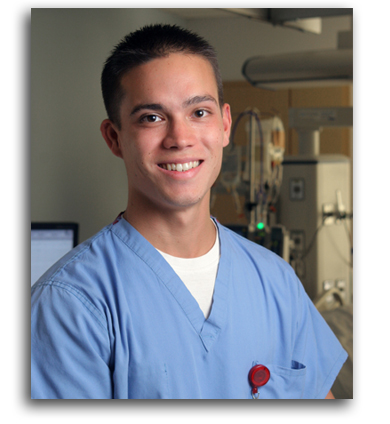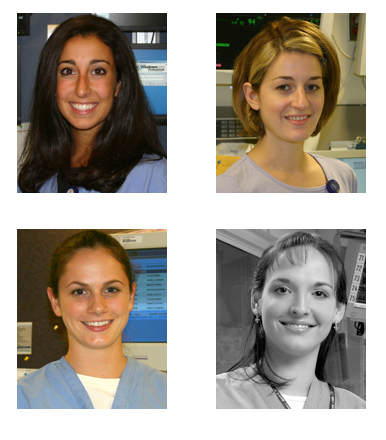The Difference a Year Makes

In one of Adam Olson's first months on the Neuroscience ICU, he and his clinical colleague Lynette Wardwell, RN, were assigned to care for a 50-year-old patient who had collapsed from a major subarachnoid hemorrhage (bleeding between the brain and the middle membrane covering the brain) caused by a ruptured aneurysm. The patient's husband and two children were in shock-there had been no warning signs. The care team knew she wouldn't make it. Ultimately, the patient passed away with her grief-stricken family by her side.
At the time of that emotional, complicated case last December, Olson was a student of the inaugural class of BWH's Critical Care Intern program, designed and taught by Mary Pennington, RN, MS, CCRN, CNRN, to give exceptional newly-licensed nurses a critical care foundation and the skills to adapt to the hectic ICU environment.
Crucial support from experienced nurses
The fast-paced setting and acute patient condition exemplified in that case drew Olson, a graduate of UMass Amherst, to critical care nursing. Beginning a nursing career in this demanding field is not be possible without the commitment of experienced nurses, like Wardwell, to educate NLNs.
“You can be thrown curves in the ICU,” said Wardwell, a veteran nurse with 18 years of experience at BWH. “You learn to deal with a lot of emotional issues of patients and their families. New nurses are learning in a stressful environment.”
Through that case, Olson learned from Wardwell's effective communication with the patient's family. “One of the most difficult aspects of our profession is interacting with patients' families during stressful times,” he's said. “You need to make a good impression so you earn their trust.”
When Olson joined the unit last October, he worked side-by-side with Wardwell. “At the beginning, you help the NLNs set up the plan of care and goals for the day and understand their function in the patient's care,” said Wardwell of her role as clinical colleague. “With time, you cut the strings a little and let them be more independent, but you continue to supervise.”
For Olson, a self-described hands-on learner, this relationship was critical to his growth as a nurse. While in nursing school, he worked in another ICU and saw several patients with pulmonary artery (PA) catheter lines. “The PA lines look very confusing if you've never seen or worked with them before,” he recalled. Observing their care did not allow him to become familiar enough with the equipment, but the hands-on training he has since received at BWH makes him confident in caring for these patients.
“BWH provides a lot of teaching for nurses coming right out of nursing school,” said Wardwell. “Their skills are broadened greatly by one year of experience here.”
An ongoing education
Olson, who completed the intern program in January with four other students, continues to learn. “At least twice a week, I see something new,” he said.
That's one of the reasons the unit is an excellent learning environment, said Vincent Vacca, RN, MSN, CCRN, nurse educator for the Neuro ICU. Because the brain controls the body, the unit's patients may have problems with cardiac and pulmonary functions, exposing nurses to multiple systems of the body and equipment like PA lines.
To support new nurses, the unit provides clinical colleagues, nurses in charge and the nurse educator. “And, on any given shift, we have a range of nurses working, from those who are relatively new to those who are very experienced,” said Vacca, who reviews Olson's patients with him when they work the same shifts. “Face-to-face discussion is an effective way to share a person's knowledge,” she said.
In addition to rounds and inservices, Vacca developed a test that requires newer nurses to research critical care concepts relevant to daily practice. When Olson completes the challenging 25-question test, he and Vacca will discuss the answers as a means of ongoing education.
When unfamiliar issues do arise, Olson knows that he's never alone. “Most of the nurses are always willing to answer questions. There's a great support system here,” he said.
Olson's willingness to learn and his retention of knowledge have put him “well on his way to becoming an expert critical care nurse,” said Vacca.
